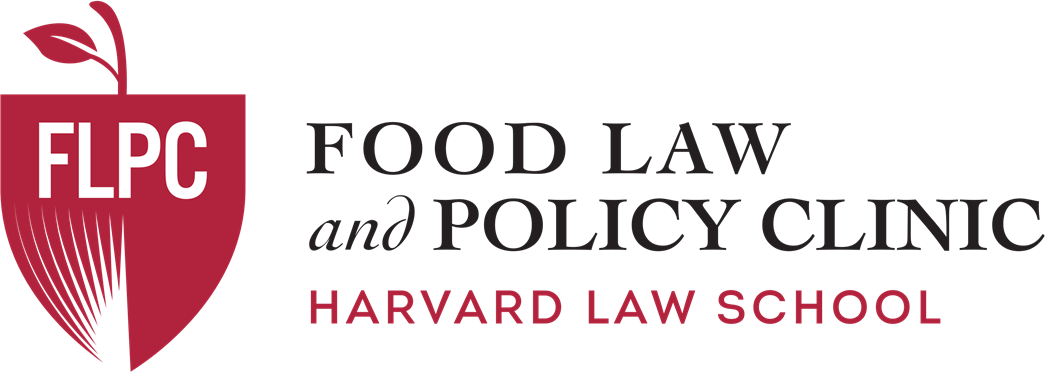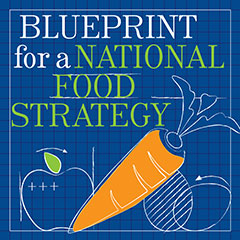About the Blueprint Project
Authors
This project was created as a partnership between Vermont Law School’s Center for Agriculture and Food Systems and the Harvard Law School Food Law and Policy Clinic. The lead authors of the Blueprint for a National Food Strategy and The Urgent Call for a U.S. National Food Strategy: An Update to the Blueprint are Laurie J. Beyranevand, Professor of Law and Director of the Center for Agriculture and Food Systems at Vermont Law School and Emily M. Broad Leib, Clinical Professor of Law and Faculty Director of the Harvard Law School Food Law and Policy Clinic.
The Urgent Call for a U.S. National Food Strategy: An Update to the Blueprint was written with significant research, writing, input and editing support from Esther Akwii, Clinical Fellow of the Harvard Law School Food Law and Policy Clinic and Cydnee Bence, LLM Fellow at the Center for Agriculture and Food Systems at Vermont Law School. In addition, the following students contributed significant research and writing to the report: Bradley Adams, Madison McDonald, Tessa Pulaski, Ali Ruxin, and Ali Schklair. Finally, the following Food Law and Policy Clinic Students at Harvard Law School contributed additional editing and writing support: Libby Dimenstein, Oscar Heanue, and Stephanie Kelemen.
This report would not have been possible without the assistance, partnership, and tremendous production support of Lihlani Skipper Nelson, Associate Director and Research Fellow, Center for Agriculture and Food Systems at Vermont Law School and the support of Kyra Sanborn, Advancement Officer at the Center for Health Law and Policy Innovation, on report production, release, and communications.
The original Blueprint for a National Food Strategy was written by lead authors listed above with support from the following individuals: Emma Clippinger, Laurie Ristino, and Aurora Moses, and was reviewed by Kate Clancy, Ferd Hoefner, and Susan Kraham. The following former student members of the Harvard Law School Food Law and Policy Clinic also contributed significant research and writing to this report: Mark Brennan, Drake Carden, Claudia Golden, Miranda Jones, Anthony Lombardi, Olivia Smith, and Conrad Zhong. This report would not have been possible without the assistance, cooperation, and production support of Lihlani Skipper Nelson and former CAFS Program Officer, Sarah Danly. Reviewers of this review included Kate Clancy, Ferd Hoefner, and Susan Kraham.
- Report Layout and Design: Andrea DiMattina; original report was designed by Community Blueprint
- Website design: Dadra Design
- The short video “Why a National Food Strategy” was produced by Community Blueprint
CAFS
 The Center for Agriculture and Food Systems (CAFS) is a research-based institution housed at Vermont Law and Graduate School. With its students, CAFS produces original scholarly research in the field of food and agriculture law and policy to serve the broadest range of food system stakeholders. With local, regional, national, and international partners, CAFS addresses food system challenges related to food and nutrition security and affordability, farmland access, food system workers, farm viability, local economies, and public health, among others. CAFS works closely with its partners to provide legal services and develop resources that respond to their needs. Through CAFS’ Food and Agriculture Clinic and Research Assistant program, Vermont Law and Graduate School students work directly on projects alongside partners nationwide, engaging in innovative work that spans the food system.
The Center for Agriculture and Food Systems (CAFS) is a research-based institution housed at Vermont Law and Graduate School. With its students, CAFS produces original scholarly research in the field of food and agriculture law and policy to serve the broadest range of food system stakeholders. With local, regional, national, and international partners, CAFS addresses food system challenges related to food and nutrition security and affordability, farmland access, food system workers, farm viability, local economies, and public health, among others. CAFS works closely with its partners to provide legal services and develop resources that respond to their needs. Through CAFS’ Food and Agriculture Clinic and Research Assistant program, Vermont Law and Graduate School students work directly on projects alongside partners nationwide, engaging in innovative work that spans the food system.
FLPC
The Harvard Law School Food Law and Policy Clinic (FLPC) was established in 2010 as the first food law clinical program in the United States. The clinic serves partner organizations and communities in the U.S. and around the world by providing guidance on cutting-edge food system issues, while engaging law students in the practice of food law and policy. FLPC is committed to advancing a cross-sector, multi-disciplinary and inclusive approach to its work, building partnerships with academic institutions, government agencies, non-profit organizations, private sector actors, and civil society with expertise in public health, the environment, and the economy. FLPC’s work focuses on increasing access to healthy foods, supporting sustainable and equitable production, reducing waste of healthy, wholesome food, and promoting community-led food system change. To learn more, visit us online.

